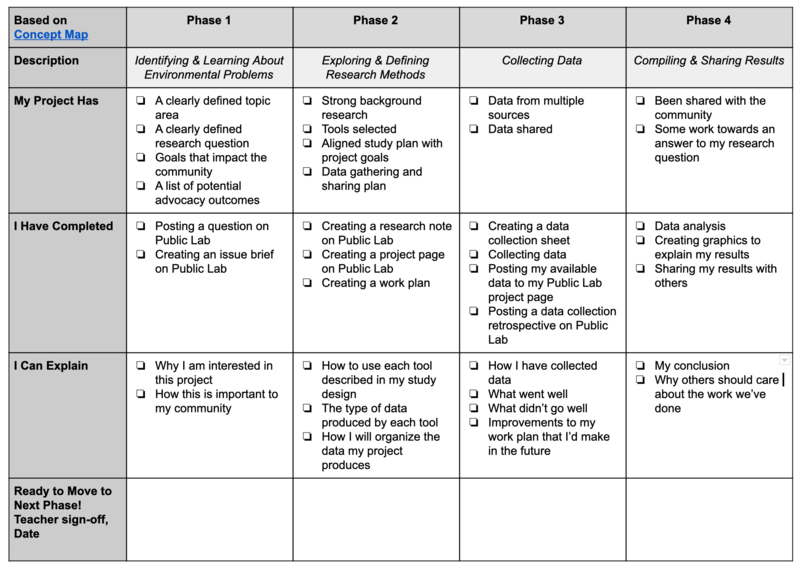This chart is designed to help students, educators, or community scientists track their progress through an environmental monitoring study. This checklist will help you stay organized as you complete your project

You can access this chart as a Google Doc here.
Project Phases
Phase 1: Students Explore Environmental Problems
- In the first phase of the project, students engage in a series of four workshops to learn about the community citizen science process and begin thinking about local environmental topics.
Phase 2: Exploring & Defining Research Methods
- In phase two, students engage with potential methods and tools to help them explore their topic. By the end students will have defined the practices they will use in their exploration and the timeline for data collection.
Phase 3: Data Collection
- With the project scope defined, students use their selected research methods to collect data on their question. Students regularly publish data on their project page so that others can see progress and results, help troubleshoot, and begin to identify patterns and trends.
Phase 4: Compiling & Sharing Results
- In the final project phase, students compile and analyze their data and identify pathways to sharing their findings. Students will explore and share ways for their community to begin to address their environmental problem.
Checkpoints
My Project Has: Before moving to the next phase, be sure that you have created, discussed, or decided upon these things for your project. It can be helpful to create a list of these where you can easily find them!
I Have Completed: Before moving to the next phase, you should have completed and shared these items. Many of the things in this category are posts on Public Lab, be sure to use a tag to organize your work.
I Can Explain: These topics are things that you should be able to explain to an educator, peer, or community member about your project. These serve as checkpoints for your critical thinking and planning for your project.
Community Science in the Classroom
This was created as a part of the Community Science in the Classroom Curriculum. This project utilizes four phases and a problem-based learning approach to allow students to progress from problem identification to sharing their story with the community.

1 Comments
I don't know what level (school or community) this is taught at. Can this be tied into something like a science fair? Many of these already exist. The goals are not identical, but one of the sections they have is environmental. It might be a good fit.
Is this a question? Click here to post it to the Questions page.
Reply to this comment...
Log in to comment
Login to comment.